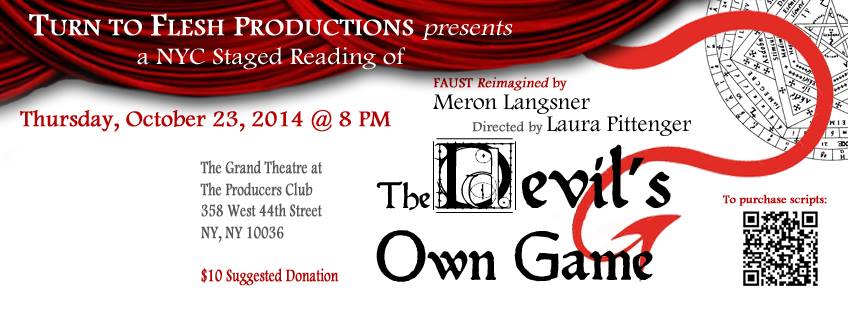turntoflesh.blogspot.com/2014/10/life-after-hell-writing-devils-own-game.html
Buy the play on Indie Theater Now! - http://www.indietheaternow.com/Play/the-devils-own-game
Text of my post below the break.
The idea that the pursuit of knowledge may in fact be ethically unsound has been around for almost as long as storytelling itself. Adam and Eve and the story of The Fall come to mind immediately, as does Prometheus, and Victor Frankenstein. Indeed, it is far too common for villains in modern adventure and science fiction stories to be scientists or other seekers of knowledge.
What is consistent is that the quest for knowledge is consistently seen as not just suspect, but immoral and dangerous. Somehow this strain of anti-intellectualism has made its way into the Western cultural subconscious and has become a sort of twisted ethical standard of anti-intellectualism.
Why is the pursuit of knowledge a crime worthy of damnation? What makes it immoral on the scale of those offenses that can land someone in Dante’s Inferno, when the knowledge itself is neutral? The application of information may be positive or negative, but the information itself just Is.
This brings us to Johannes Faust.
Faust is described by some scholars as a Renaissance Man trapped in a medieval moral code. I find this a useful way of approaching the archetype. We speak of Faustian Bargains as paying horrible prices for short term benefits, but the term is rarely applied to the pursuit of knowledge (except perhaps in the current state of higher education).
I want to know what happens after.
What happens when you have the smartest man of his time in Hell. And that man has been given access to unlimited knowledge. What use is that man to Hell if he is just being tortured? And what use would Hell best put him to? And, if that man is in Hell, what will he do to try to change his circumstances? And how long would that game go on? And what else might be included in his torture?
And in today’s world, where so many areas of research are so contentious, and with anti-intellectualism so much a part of the cultural undercurrent, how long till new Faustian bargains (in the sense of the original story) are struck?
These are the thoughts and questions that led me to writing The Devil’s Own Game. I wanted to revisit and remix an archetype that resonates with me and repulses me. I prefer to think that I stand on the shoulders of the giants who have told this story before, and that I am not so much retelling the story, because in my version, the story as we know it has already occurred, but that we are seeing the consequences and repercussions of the story.
I hope the play raises more questions than it does answers.

 RSS Feed
RSS Feed